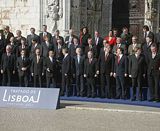Charter of Fundamental Rights of the European Union


The Charter of Fundamental Rights of the European Union is a document containing human rights provisions, ‘solemnly proclaimed’ by the European Parliament, the Council of the European Union, and the European Commission on 7 December 2000. An adapted version of the Charter was proclaimed on 12 December 2007 in Strasbourg, ahead of the signing of the Treaty of Lisbon, which makes the Charter legally binding in all countries except Poland and the United Kingdom. The updated Charter was signed by European Parliament president Hans-Gert Poettering, European Commission president José Manuel Barroso, and Portuguese prime minister José Sócrates, at the time President of the Council of the European Union.[1]
Contents |
Origin
The European Court of Justice decided in 1996 that the treaties establishing the European Community do not empower it to accede to the European Convention on Human Rights, this despite all EC/EU member states being signatories to the Convention (Opinion 2/94 "Accession by the Community to the European Convention for the Protection of Human Rights and Fundamental Freedoms" of 28 March 1996).
Following this, the Cologne European Council (3/4 June 1999) entrusted the task of drafting the Charter to a Convention.[1] The Convention held its constituent meeting in December 1999 and adopted the draft on 2 October 2000. The Biarritz European Council (13/14 October 2000) unanimously approved the draft and forwarded it to the European Parliament and the European Commission.
The European Parliament gave its agreement on 14 November 2000 and the Commission on 6 December 2000. The Presidents of the European Parliament, the Council and the Commission signed and proclaimed the Charter on behalf of their institutions on 7 December 2000 in Nice. Thus the aforementioned three institutions of the European Union (Council, Commission, and Parliament) decided that the Charter is the appropriate format (for the moment) of presenting the fundamental principles of human rights for the Union.
Status
As it stands, the Charter is not a treaty, constitutional, or legal document, and has the sui generis value of a ‘solemn proclamation’ by three of the Union’s most important institutions. Its text is mainly in harmony with the Universal Declaration of Human Rights and the European Convention on Human Rights, and therefore can be taken as a confirmation (by the Council, Commission, and Parliament) of the pre-existing rights contained therein, while adding widely-accepted principles such as the ‘right’ to good administration, workers’ social rights, and bioethics. The Charter’s ‘power’ or ‘effect’, if it has any, may be only these:
- The proclaiming institutions (and other institutions such as the European Court of Justice) are not going to contradict the Charter, since they have ‘solemnly proclaimed’ it.
- Common law, Community law, and case law are generally in harmony with it, so there is little probability of conflict.
It does not have the status of Community law. Therefore, cases cannot be brought solely on the ground of a contradiction against the Charter.
As part of the proposed Treaty establishing a constitution for Europe
Part II of the proposed European Constitution, which was signed in October 2004 but which failed to be ratified after referendum defeats in France and the Netherlands, contained a version of the Charter. The intention was to enable the European Union to accede to the European Convention on Human Rights, thus enabling the European Court of Human Rights to rule on the basis of this Convention.
As part of the Treaty of Lisbon
The Treaty of Lisbon that has been signed in December 2007 makes a reference to the Charter, whereby the Charter gains legally binding force. The Charter was slightly modified before the signing of the Treaty of Lisbon, to make it resemble the text that was part of the rejected European Constitution. The article referring to the Charter reads as follows:
The Union recognises the rights, freedoms and principles set out in the Charter of Fundamental Rights of the European Union of 7 December 2000, as adapted at Strasbourg, on 12 December 2007, which shall have the same legal value as the Treaties.
Notable provisions
The Charter is organized into 6 titles: dignity, freedoms, equality, solidarity, citizens’ rights, and justice. The second, third, and fourth rubrics reflect the three generations of human rights after Karel Vasak.
- (Article 3) Prohibition of reproductive cloning of human beings
- (Article 53) ‘Nothing in this Charter shall be interpreted as restricting or adversely affecting human rights and fundamental freedoms as recognised, in their respective fields of application, by Union law and international law and by international agreements to which the Union, the Community or all the Member States are party, including the European Convention for the Protection of Human Rights and Fundamental Freedoms, and by the Member States' constitutions.’
See also
- Four Freedoms
- Fundamental right
- Capital punishment in the European Union
References
- ↑ Charter of Fundamental Rights: the Presidents of the Commission, European Parliament and Council sign and solemnly proclaim the Charter in Strasbourg
External links
- Charter of Fundamental Rights of the European Union (and in PDF format).
- Charter of Fundamental Rights of the European Union as adapted at Lisbon
- European Parliament’s explanation of the Charter
- Detailed Guide to the EU Charter
- Official FAQs
- Charter of Fundamental Rights of the European Union European Navigator
- EU Agency for Fundamental Rights.
|
|||||||||||||||||||||||||||||||
|
|||||||||||||||||
